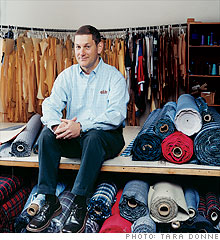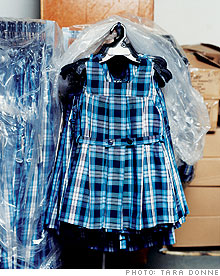Dress for success
A school uniform supplier battles the economic downturn.
 |
| Michael Cohen, CEO of Cloz |
 |
| This plaid jumper is a staple of the company's inventory. |
 |
| A long roster of clients requires a lot of thread. |
CHICAGO (Fortune Small Business) -- Even after nearly 20 years at the helm of a successful apparel company, Michael Cohen cheerfully confesses he is no fashion maven. If anything, he's responsible for squelching the sartorial desires of tens of thousands of the nation's schoolchildren. Cohen is the king of school uniforms.
His Chicago-based firm, Cloz, sells uniforms to some 200 elite private and boarding schools in the U.S., among them Nightingale-Bamford School in New York City and National Cathedral School in Washington, D.C. Launched in Cohen's apartment in 1989 with an initial investment of $500, Cloz today is a profitable $10-million-a-year catalogue and online retailer.
Cohen, 42, has dressed the scions of America's wealthiest families for almost two decades. He even supplied the maroon uniforms the Obama girls wore during gym classes at the University of Chicago Lab Schools. Cloz also outfits affluent tykes for summer camp; the company has the exclusive contract for about 100 sleepaway camps in New England and the upper Midwest.
Still, Cohen has the jitters. He frets that his business is highly seasonal. Cloz processes thousands of orders a day for camp gear during the spring, then stuffs and ships boxes full of school attire until the end of September. In late fall orders slow to a trickle, and by early winter the place feels like a schoolyard in July. Cohen says he's tempted to launch a sideline business to take up the slack during the slow season.
Compounding Cohen's fears is the fact that many of his customers are experiencing the full brunt of the economic crisis. Former big spenders are pinching pennies, and early reports suggest some are cutting back on such luxuries as private school and camp stays for their children. Cohen doesn't know yet how the slump might affect his company, but he wants to prepare for the worst.
Despite the downturn, Cohen also needs to make sure his firm is poised for rapid growth once the economy recovers. Currently crammed into small offices on Chicago's South Side, the Cloz warehouse is an overstuffed jumble. Cohen hopes to streamline production and manage inventory better by investing in additional space and new technology. But his bank is paralyzed by the credit crunch and can't provide the capital that Cloz needs to grow.
To help Cohen sort through his options, Fortune Small Business recruited three experts for a business makeover. First up is Larry Flinn, chairman of Flinn Scientific in Batavia, Ill., one of the top suppliers of scientific equipment to U.S. schools.
Flinn, 53, urges Cohen to stop worrying about the slow season and focus on winning more of the promising school market. Thousands of U.S. private schools require uniforms. The $490-million-a-year school uniform market is growing at a double-digit clip annually - much faster than the market for camp gear, according to New York City market research firm Stax. But school uniform sales make up just 40% of Cloz's revenues.
"Jamming some new venture into the slow season just to fill the vacuum is risky," Flinn cautions. "Don't take your eye off your core business, especially when you've got so much room to grow."
Instead, Cohen should use the slow months to prepare for the annual burst of activity in the spring. During the winter, for example, Cloz could tackle the time-consuming job of affixing school emblems to backpacks, using a conservative estimate of the number that parents are likely to order.
Flinn reminds Cohen that the school market is a challenge because administrators are slow to respond and wary of change. Cloz could spend three or four years wooing a school before winning it over. "Be patient and wait for the school's current supplier to slip up," Flinn advises. "That's your opening, but you'll have only one chance to wow them."
Aggressive sales tactics can offend school officials and teachers, Flinn adds. But these educators are hungry for information that will help engage students in learning. F
linn's company has fostered loyalty among science teachers with its Fantastic Flinn Freebies, which include newsletters on trends in science education, seminars on safety and videos of award-winning teachers performing experiments. (Flinn even offers a Student Teacher's Survival Kit, containing safety posters and coupons for equipment.)
Cohen brightens. "We could create a newsletter that discusses how schools are coping with the downturn!" he says. "And in the past we've sent a big box of surplus uniforms to National Cathedral School for students who can't afford them."
Next expert at bat: Brian Sommer, founder of Techventive, a marketing and technology consultancy in Batavia, Ill. "Clearly, you've got space issues," Sommer, 52, says during a tour of Cloz's crowded headquarters. "You're growing like ivy."
Cohen admits that he's having difficulty obtaining credit to fund an expansion. Money permitting, he would like to double the size of his 36,000-square-foot facility, which houses his offices, sewing area and warehouse. "Banks are looking for any excuse not to lend to small business," Cohen complains.
"Your bank has you on a short leash," Sommer says briskly. "You're probably getting some business services from them, but you can't get a loan." Cohen nods wearily. "This is a fixable problem," Sommer continues. "You don't have the right banker."
Shop for a new one immediately, Sommer tells Cohen. Start by getting recommendations from other small business owners in and around Chicago. (Peer networking groups, such as Young Presidents' Organization, are good places to meet them.)
Once you're armed with references, interview bankers to determine which will take the keenest interest in your firm. Bankers who want your business will visit your company, ask probing questions and follow up with suggestions. Your banking relationship is a lot like a marriage, Sommer says; it is built over time on a foundation of trust. Be sure to send your banker monthly reports on the state of your business. Share your strategic plan. And address your banker's concerns early - before problems require his or her attention.
Cloz's Web site is the hot topic for our next expert, Chris Dalton, CEO of Acquity Group, a Web consultancy in Chicago. "How soon will you be a virtual business?" he asks Cohen, who blinks and pauses to consider the question.
"Some camps and schools have eliminated the catalogue completely to save on printing costs," Cohen says. "But I'm not sure that's good for us." He notes that children tend to pore over the printed catalogues, picking out items they want for school or camp and marking pages with Post-its. Cohen says he doesn't think his company's Web site is as enticing as a colorful catalogue.
"There are ways to enhance the online shopping experience with enlarged photos of details and so on," says Dalton, 41. "But you have other, more pressing issues."
For one, Cloz doesn't appear among the top dozen uniform-supply companies in a search for "school uniforms" on Google or Yahoo. That's a fatal flaw, Dalton says. School administrators who are unhappy with their current suppliers may start their search for a new one on the Internet. Search-engine optimization would put Cloz high on result lists. Dalton urges Cohen to immediately buy all keywords and phrases relevant to his business, including "uniforms" and "plaid jumper." Says Dalton, "It's a cheap, easy fix."
Cloz's Web site also fails to stress the firm's superb customer service. Cohen should use the site to address parents who are anxious about getting their children off to school. "You need to assure them that their child will be outfitted perfectly when the bell rings on the first day," Dalton says.
One month later, Cohen has moved quickly on several of the experts' suggestions. He met with a banker from Harris Bank in Chicago, which caters to small and mid-size businesses. He also dropped plans to launch a slow-season business. Instead he is gearing up for the spring rush. And he's preparing an e-newsletter that he'll send to schools nationwide.
FSB will check in on Cloz and let you know how things turn out for the company. ![]()
-
The Cheesecake Factory created smaller portions to survive the downturn. Play
-
A breeder of award-winning marijuana seeds is following the money and heading to the U.S. More
-
Most small businesses die within five years, but Amish businesses have a survival rate north of 90%. More
-
The 10 most popular franchise brands over the past decade -- and their failure rates. More
-
These firms are the last left in America making iconic products now in their twilight. More









